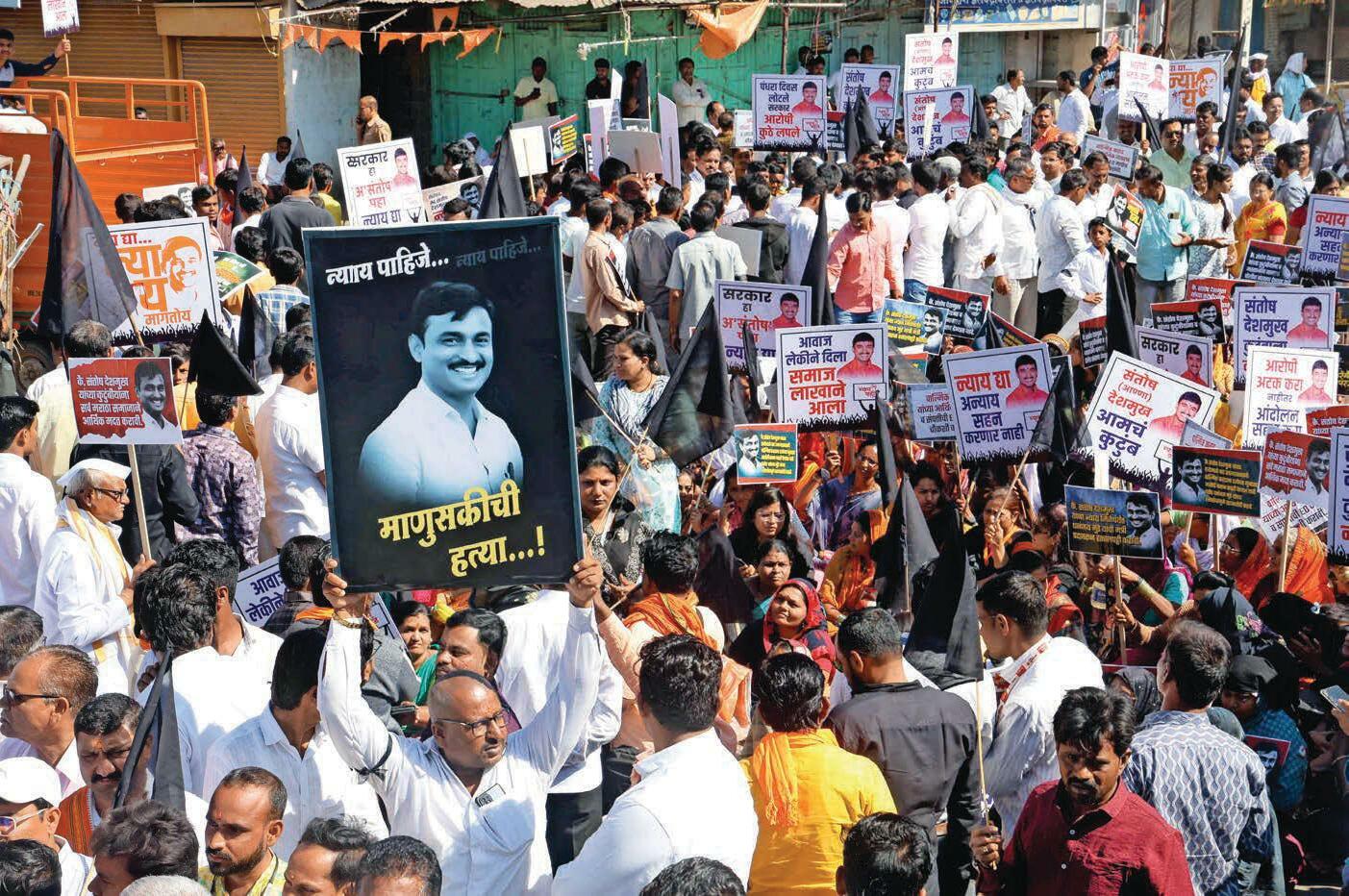Versuchen GOLD - Frei
AS BEED BLEEDS
THE WEEK India
|January 19, 2025
The murder of a sarpanch in Beed district has exposed a web of political rivalries, caste conflicts and police complicity

The gruesome murder of Santosh Deshmukh, sarpanch of Massajog village in Kej taluk of Beed district, has shaken Maharashtra. It has also exposed an unholy alliance between the police and the henchmen of politicians in the lawless Beed, a district that has witnessed more than 300 murders in the last five years.
Santosh, who was popular in Massajog, could have been saved had the police acted on time, said his brother Dhananjay. Had the police registered a stringent case against the accused on December 6, Dhananjay told THE WEEK, Santosh would still be alive. Instead, he said, the police were busy helping the accused, who are now in jail.
Understanding the circumstances that led to Santosh's murder is important. Suresh Dhas of the BJP, who represents Ashti constituency in Beed district in the assembly, alleged that the murder plot was hatched in May 2024. The accused seized their opportunity in December, when Santosh intervened in a dispute between the accused and the security staff of a company named Avada Energy. The accused, led by a man named Sudarshan Ghule, had demanded ₹2 crore from the company.
On December 6, Ghule and the other accused allegedly began beating up Ashok Sonavane, a security personnel at Avada Energy and a native of Massajog. Sonavane called Santosh, his sarpanch, who rushed to the Avada Energy office. Santosh tried to reason with Ghule, but they ended up exchanging slaps.
Villagers soon intervened and calmed the situation. Sonavane, a dalit, and Santosh then went to the police station to register a complaint, hoping to invoke the Schedule Caste and Scheduled Tribe (Prevention of Atrocities) Act against Ghule and the other accused. But the police refused to register the complaint.
Diese Geschichte stammt aus der January 19, 2025-Ausgabe von THE WEEK India.
Abonnieren Sie Magzter GOLD, um auf Tausende kuratierter Premium-Geschichten und über 9.000 Zeitschriften und Zeitungen zuzugreifen.
Sie sind bereits Abonnent? Anmelden
WEITERE GESCHICHTEN VON THE WEEK India

THE WEEK India
The tenth nerve
Maya, all of 18, had been battling refractory epilepsy for the better part of her adolescence. The word ‘refractory’ always leaves a bitter taste in my mouth as it signifies a resistance to the arsenal of medications we typically rely upon. Maya's face, although etched with the fatigue of countless seizures, still held the spark of youthful curiosity. Her parents’ faces were a blend of apprehension and desperate hope as they held hands in front of me.
2 mins
July 20, 2025

THE WEEK India
F-35: Owner's pride, others' meme
Heard of the mitrailleuse machine gun? The world’s first rapid-fire gun developed in the 1860s, it was like Onida TV—owner’s pride and enemy's envy. The French owners kept it under such thick wraps that when the Franco-Prussian war of 1870-71 broke out, the guns were issued to front-line troops without operating manuals. By the time clearances were obtained and the manuals arrived, France had lost the war.
2 mins
July 20, 2025

THE WEEK India
Old dog can learn new tricks
Newlyweds start the day by murmuring sweet nothings. Those past the seven-year-itch exchange polite greetings in the mornings. Couples nearing their silver jubilees rudely grunt 'good morning' to each other.
3 mins
July 20, 2025

THE WEEK India
UNAPOLOGETICALLY SOUTH
Chef Vijaya Kumar, who won the James Beard award in New York, says it signifies not just a personal triumph, but also a cultural shift
3 mins
July 20, 2025

THE WEEK India
MASTER CLASS
Light and shadows were at play in his films, like in life. His films were a slice of his life, but with technical flourishes and sharp observations on society and its hypocrisies. With that, Guru Dutt created his distinct style and cinematic language. On his birth centenary, THE WEEK takes you through the life and work of one of the greatest filmmakers
25 mins
July 20, 2025

THE WEEK India
The Dutt aesthetic
It was sculpted with light and moulded in music
4 mins
July 20, 2025

THE WEEK India
The other pandemic
Last month, there was a spurt in Covid infections, igniting panic which led to some people recalling the horrors of five years ago. But, as far as pandemics go, they have turned out to be limited, with relatively few casualties and rapid recoveries. On the other hand, a real epidemic has gone largely unnoticed, even as it slowly but inexorably takes a horrific toll.
2 mins
July 20, 2025

THE WEEK India
Stress less. Live more
Across boardrooms and living rooms, between deadlines and daily rituals, a quiet question lingers. It surfaces in conversations, in passing thoughts, and in rare moments of stillness. How do we hold everything together, and more meaningfully? How do we move through the busyness of life with purpose?
2 mins
July 20, 2025

THE WEEK India
Poet with a camera
Guru Dutt crafted images so evocative that they transcended words
3 mins
July 20, 2025

THE WEEK India
BROKEN SYSTEM, BLEEDING FAITH
Kerala’s health sector, long seen as a model, is buckling under a structural crisis
6 mins
July 20, 2025
